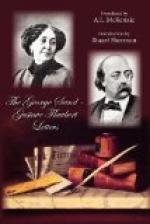The son of an eminent surgeon of Rouen, Gustave Flaubert may have acquired from his father something of that scientific precision of observation and that cutting accuracy of expression, by which he gained his place at the head of modern French realism and won the discipleship of the Goncourts, Daudet, Zola, and Maupassant and the applause of such connoisseurs of technique as Walter Pater and Henry James. From his mother’s Norman ancestry he inherited the physique of a giant, tainted with epilepsy; a Viking countenance, strong-featured with leonine moustaches; and a barbaric temper, habitually somewhat lethargic but irritable, and, when roused, violent and intolerant of opposition. He had a private education at Rouen, with wide desultory reading; went to Paris, which he hated, to study law, which he also hated; frequented the theatres and studios; travelled in Corsica, the Pyrenees, and the East, which he adored, seeing Egypt, Palestine, Constantinople, and Greece; and he had one, and only one, important love-affair, extending from 1846 to 1854—that with Mme. Louise Colet, a woman of letters, whose difficult relations with Flaubert are sympathetically touched upon in Pater’s celebrated essay on “Style.” When by the death of his father, in 1845, he succeeded to the family-seat at Croisset, near Rouen, he settled himself in a studious solitude to the pursuit of letters, which he followed for thirty-four years with anguish of spirit and dogged persistence.
Flaubert probably loved glory as much as any man; but he desired to receive it only on his own terms. He profoundly appeals to writers endowed with “the artistic conscience” as “the martyr of literary style.” In morals something of a libertine, in matters of art he exhibited the intolerance of weakness in others and the remorseless self-examination and self-torment commonly attributed to the Puritan. His friend Maxime Du Camp, who tried to bring him out and teach him the arts of popularity, he rebuffed with deliberate insult. He developed an aversion to any interruption of his work, and such tension and excitability of nerves that he shunned a day’s outing or a chat with an old companion, lest it distract him for a month afterward. His mistress he seems to have estranged by an ill-concealed preference to her of his exacting Muse. To illustrate his “monkish” consecration to his craft we cannot do better than reproduce a passage, quoted by Pater, from his letters to Madame Colet:
“I must scold you for one thing, which shocks, scandalises me, the small concern, namely, you show for art just now. As regards glory be it so—there I approve. But for art!—the one thing in life that is good and real—can you compare with it an earthly love?—prefer the adoration of a relative beauty to the cultus of the true beauty? Well! I tell you the truth. That is the one thing good in me: the one thing I have, to me estimable. For yourself, you blend with the beautiful a heap of alien things, the useful, the agreeable, what not?




